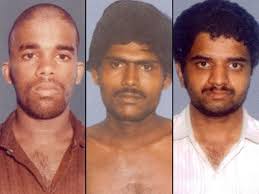TN informs Centre of decision to release Rajiv case convicts
Updated by admin on
Wednesday, March 02, 2016 08:55 PM IST

Chennai:
The Government of Tamil Nadu, after taking into consideration the petitions of the seven convicts, has decided to remit the sentence of life imprisonment and to release the seven persons since all of them had already served imprisonment for 24 years. In view of the Supreme Court judgement that the State Government should consult the Centre, the Tamil Nadu Government Chief Secretary K Gnanadesikan in a letter to Union Home Secretary has sought the Centre's views on the State decision.
Out of these 7 persons, four persons -- Murugan, Santhan, Jayakumar and Robert Payas are foreigners, i.e, Sri Lankan nationals. The other three are Nalini, Ravichandran and Perarivalan.
"It has become necessary for us to request you to communicate your views under section 435 Cr. P. C. , on the decision of the Government of Tamil Nadu. This communication is being sent without prejudice to our right to move the Supreme Court to review its judgement dated Dec 2, 2015, wherein the Constitution Bench had taken the view that the word consultation means concurrence and without prejudice to our rights and contentions in W.P. 48/2014", the chief secretary K Gnanadesikan has pointed out to the Secretary, Home Ministry,
The Supreme Court's five-judge Constitutional Bench had ruled on December 2, 2015, that the State Government decision in February 2014 to release them came as a setback to the Jayalalithaa government here.
Blocking the release of seven convicts in the Rajiv Gandhi assassination case, the Supreme Court bench had said state governments cannot remit jail terms of convicts in cases of national importance without the Centre’s approval. The court blocked the J Jayalaithaa-led Tamil Nadu government’s move to free all seven convicts, and said no remission can be granted by “putting the interest of the nation in peril”.
Blocking the release of seven convicts in the Rajiv Gandhi assassination case, the Supreme Court Wednesday said state governments cannot remit jail terms of convicts in cases of national importance without the Centre’s approval. The court blocked the J Jayalaithaa-led Tamil Nadu government’s move to free all seven convicts, and said no remission can be granted by “putting the interest of the nation in peril”.
Regretting that “lawlessness is the order of the day”, the Constitution Bench held that a state government cannot be allowed to exercise its power of remission and free convicts in cases which have been investigated by central agencies such as CBI and NIA and where offences entail death penalty or conviction is for an offence relating to Executive Power of the Union.
The bench, led by Chief Justice H L Dattu, held that cases such as the killing of a former prime minister would mean assassinating “national figures of very high status by resorting to diabolic criminal conduct” and that “such a situation should necessarily be taken as the one coming within the category of internal or external aggression”.
The judgment, by a 3:2 majority, noted that granting the Centre overriding authority in cases of national importance “cannot held to be interfering with the independent existence of the state concerned”. While Justice F M I Kalifulla, the author of the verdict, and Justice P C Ghose wrote the majority judgment with the CJI, Justice Uday U Lalit and Justice Abhay M Sapre concurred with them on all issues except one legal point. The two judges differed on whether there can be a “special” category of punishment beyond 14 years in jail and if the power of the state government for remission can be curtailed. Underscoring that life imprisonment means jail term till the end of one’s natural life, the majority verdict held that there is no bar on a high court and the top court to sentence a convict to 20 or 30 years in jail without benefit of remission.
Referring to the Rajiv Gandhi case, the court said: “We find no scope to apply the concept of ray of hope to come to the rescue of such hardened, heartless offenders, which if considered in their favour will only result in misplaced sympathy and again will not be in the interest of society. Therefore, we reject the said argument outright.” It also criticised the Tamil Nadu government for exercising its power of remission “suo motu”.
The bench ruled that no state can carry out this exercise suo motu and there has to be an application by the convict first. On February 18, 2014, the apex court had commuted death sentence of three convicts in the case — Murugan, Santhan and Perarivalan — due to inordinate delay by the executive in deciding their mercy plea. The next day, the Tamil Nadu government suo motu ordered the release of all seven life convicts. The Centre then rushed to the court on February 20, 2014 and got their release stayed. The bench then framed seven questions and referred it to a Constitution Bench. After the Dec 2, 2015, verdict, the case has been sent back to the three-judge bench.
The Chief Secretary letter has pointed out that the W.P. of the Centre was directed to be posted before the three-member Bench of the SC for hearing. The said W.P is yet to be posted before the three Judges for hearing, the Chief Secretary has pointed out in his letter to the Home Secretary.